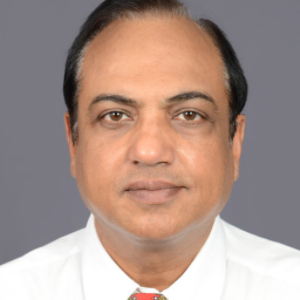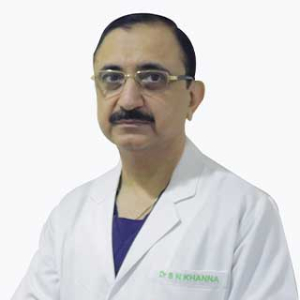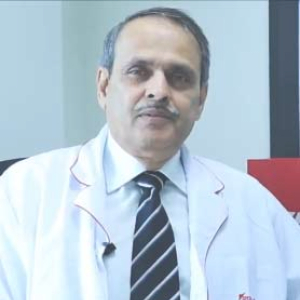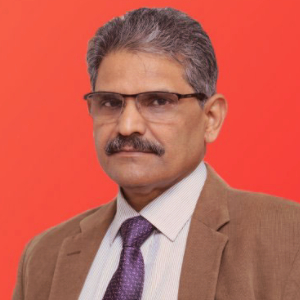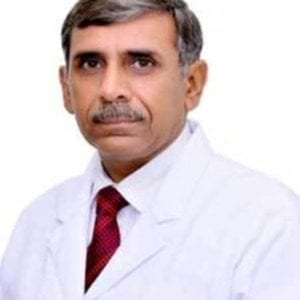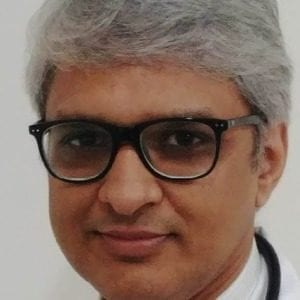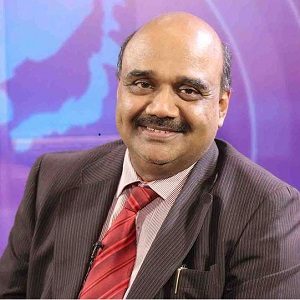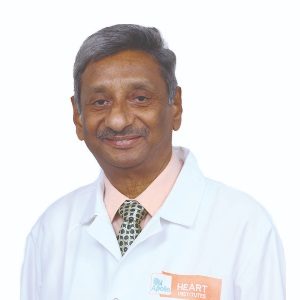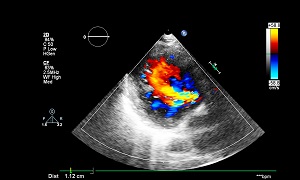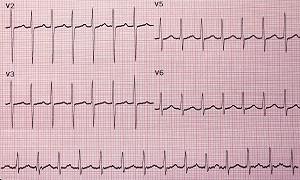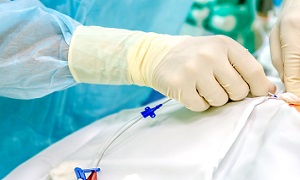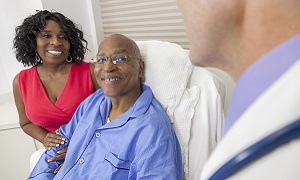Best Mitral Valve Replacement Doctors in India
Here is a list of the most reputed Cardiac Surgeons in India for Mitral Valve Replacement or repair.
- Top Cardiac Surgeon | Kokilaben Hospital, Mumbai, India
- 36+ Years Experience
- Kokilaben Dhirubhai Ambani Hospital
Profile Highlights:
- Dr. Nandkishore Kapadia is one of the leading Cardiothoracic and vascular surgeons in India excelling in heart and lung transplant surgeries.
- He has 36+ years of experience in the field during which he has performed over 10000 CABGs, 2000 heart valve repairs, and 800 minimally invasive cardiac surgeries.
- He has also performed more than 5000 open heart surgeries, 200 heart and lung transplant surgeries, and 150 VAD and ECMO implantation procedures.
- Top Cardiac Surgeon | Fortis Escorts, New Delhi, India
- 26+ Years Experience
- Fortis Escorts Heart Institute New Delhi
Profile Highlights:
- Dr. Surendra Nath Khanna is a leading cardiovascular and thoracic surgeon specializing in minimally invasive cardiac surgeries, heart valve repairs, and heart failure surgeries.
- Dr. Surendra Khanna has 26+ years of experience in cardiac care and has performed more than 17000 surgeries that include beating heart surgery, mitral and aortic valve surgery, and double valve replacement surgery.
- His expertise lies primarily in adult cardiac surgeries and has done some of the most complex cardiac surgeries in India
- Cardiac Surgeon, Mumbai, India
- Over 30 years’ experience
- Jaslok Hospital and Research Centre, Mumbai
Profile Highlights:
- Dr. Suresh V Joshi is a cardiac surgeon in Mumbai with expertise in undertaking complex surgeries as a result of congenital heart diseases.
- He holds an extensive experience of over 3 decades in cardiac surgery and specializes in Coronary Artery Bypass Grafting (CABG); specifically Beating Heart CABG and Minimally Invasive Cardiac Surgeries.
- He is an expert in all kinds of coronary and interventional cardiac procedures and has performed over 15,000 cardiac surgeries for different kinds of heart defects and disorders.
- Cardiac Surgeon, New Delhi, India
- Over 30 years’ experience
- Manipal Hospitals, New Delhi
Profile Highlights:
- Dr. Yugal Kishore Mishra is a well-known cardiovascular and thoracic surgeon in Delhi specializing in Minimally Invasive and Robotic cardiac surgeries.
- He has 3 decades of experience in CTVS and has performed more than 19,000 open heart surgeries to date that including various types of minimally invasive cardiac procedures such as the port access approach for valve surgery and ASD closure.
- He is the founder of the Robotic Cardiac Surgery Program at Fortis Escorts Heart Institute where he has performed over 500 robotic cardiac surgeries.
- Cardiac Surgeon, Gurugram, India
- Over 15 years’ experience
- Narayana Superspeciality Hospital, Gurugram
Profile Highlights:
- Dr. Rachit Saxena is an experienced cardiac surgeon, who is known for his extreme dedication to his profession, and for providing absolute patient satisfaction.
- Supported by an efficient cardiac surgical team, Dr. Saxena is known for successfully managing the most complex of cardiac surgical problems.
- Dr. Rachit Saxena is known especially known for the capability to perform cardiac surgery with minimal blood requirement and ensure early mobilization and return to work.
- Cardiovascular Thoracic Surgeon, Gurugram, India
- Over 27 years’ experience
- Max Super Specialty Hospital, Saket, New Delhi
Profile Highlights:
- Dr. Sandeep Singh is an esteemed cardiac surgeon with over three decades of experience in Cardio-Thoracic and Vascular Surgery (CTVS).
- He currently serves as the Senior Director and Head of CTVS at Max Healthcare.
- Dr. Singh’s educational background is equally impressive, with an MBBS and MS in General Surgery from S.N. Medical College, Agra, and an M.Ch. in CTVS from the L.P.S. Institute of Cardiology, Kanpur.
- Cardiologist, Gurugram, India
- Over 20 years’ experience
Profile Highlights:
- Dr. Vivek Chaturvedi is a highly experienced and acclaimed cardiologist with over 20 years of experience.
- He has performed more than 2500 cardiac ablations, several of them for complex arrhythmias like atrial tachycardia, ventricular tachycardia, VPC, and atrial fibrillation using the latest technology like 3D Electroanatomic mapping.
- He has more than 50 publications in international journals & books.
- Cardiothoracic Surgeon, Chennai, India
- Over 25 years’ experience
- Apollo Hospitals Greams Road
Profile Highlights:
- Dr. T Sundar is one of the best cardiothoracic surgeons in India.
- He is having extensive exposure to critical heart diseases and he has operated on them successfully.
- Dr. T Sundar is a Senior Consultant at Apollo Hospitals since 2003.
- He has been associated with international standards of surgery and diagnosis since his education period.
- Top Cardiothoracic and Vascular Surgeon | Apollo Hospital, New Delhi, India
- 36+ Years Experience
- Indraprastha Apollo Hospital, New Delhi
Profile Highlights:
- Dr. N Sastri is a renowned cardiothoracic surgeon in India with extensive experience in critical heart surgeries.
- He has nearly 36 years of experience and is a senior consultant- Cardiothoracic & Vascular Surgery with Indraprastha Apollo Hospitals, New Delhi.
- Dr. Sastri specializes in the diagnosis and treatment of vascular disorders using advanced techniques. He has expertise in Total Anomalous Pulmonary Venous Connection Repair, Arterial and Ventricle Defects Surgery, Cardiac Resynchronization Therapy, Balloon Valvuloplasty, CABG LV restoration, PDA Device Closure, PPI, Valve Replacement, and Atrial Fibrillation Surgery.
- Over the years’ Dr. Sastri had treated patients across various countries. In addition to the adult and neonatal cardiac surgeries, he is involved in research and put out many research papers in different medical journals.
- Interventional Cardiologist, Chennai, India
- Over 38 years’ experience
- Apollo Hospitals Greams Road
Profile Highlights:
- Dr. I Sathyamurthy is a veteran Cardiologist and has an experience of more than 38 years in Interventional Cardiology.
- Dr. Immaneni Sathyamurthy is a distinguished personality who bagged Padma Shri, the fourth-highest Indian civilian award. In addition to it, he was conferred many awards for his contribution to the medical sciences.
- He has over 250 publications to his credit, some of these are used as textbooks in medical courses.
Best Mitral Valve Replacement Hospitals in India
Mitral Valve Replacement
A mitral valve replacement is performed for replacing a poorly working mitral valve with an artificial one. The heart has four valves, and the mitral valve is one of them. This organ, which lies between the left atrium and left ventricle, helps the blood to flow, through the heart and out to the body.
Indications of Mitral valve replacement
Several types of mitral valve diseases exist. In mitral valve regurgitation, the flaps of the mitral valve don’t close properly, which can cause blood to leak backward into the left atrium. This commonly occurs due to valve leaflets bulging back, a condition which is known as mitral valve prolapse.
Another condition exists, which is known as mitral valve stenosis, where the leaflets become thick or stiff, which can make them fuse together. This can result in the valve opening getting narrowed, which causes a reduction in the blood flow through the valve.
The doctor will generally try to repair your mitral valve, but when a repair is no longer possible then mitral valve replacement is considered.
Purpose
This procedure is required if your heart’s mitral valve is not working properly. Surgical repair is possible, though sometimes the valve needs a replacement.
First, your doctors will need to check how serious your condition is and if you are experiencing any symptoms. If your condition is too serious, your doctor might be recommending mitral valve repair or replacement. However, if your condition is mild you might not need any surgery.
Your doctor will next need to discuss with you whether mitral valve repair or mitral valve replacement is the most appropriate for you. Doctors generally recommend mitral valve repair but if they see that it is no longer possible, they will need to perform mitral valve replacement. Doctors might next evaluate which method is best for you: Minimally invasive heart surgery or open-heart surgery.
Preparation
Before the surgery for having your mitral valve repaired or replaced, your doctor and treatment team will need to explain to you, what exactly you can expect before and after the treatment. He/she will also discuss any potential risks. If you have any questions, it is important to discuss them with the doctor and the treatment team. You will also receive instructions that you will need to follow during your recovery time.
You might need a few tests as recommended by your doctor. This can include Chest X-ray, electrocardiogram, echocardiogram, blood tests, coronary angiogram.
Talk to your doctor regarding when you should take your regular medications, and whether you should take them before the surgery. You might also need to stop eating or drinking the night before the surgery.
You will also need to bring clothing and any personal items such as eyeglasses, hearing aids, toothbrush, comb, etc.
Test done before Mitral Valve Replacement
Electrocardiogram
Stress test
Echocardiogram
Chest X-Ray
Cardiac catheterization
Cardiac catheterization involves the insertion of a thin, flexible tube (catheter) into a blood vessel through groin and is pushed forward to the heart. With the help of this test the doctors can diagnose congenital heart defects, check pumping of heart and function of the heart valves
Procedure
First, you will be sedated before the surgery, with general anesthesia. Therefore, you will be in deep sleep during the procedure and won’t feel any pain.
The operation generally takes several hours. During the procedure, you will be connected to a heart-lung bypass machine, which will keep your blood moving through your body.
First, an incision is made, down the middle of your chest. The doctor will need to separate your heart, to access your breastbone.
Then the surgeon will remove the current mitral heart valve, after which he/she will replace it with a new one. After this is done successfully, the heart-lung machine will be removed, and your breastbone will be wired back together. Then your team will sew or staple the incision in your skin back together again.
If you receive a mechanical valve, you will require blood-thinning medications for the rest of your life for preventing any blood clots. Doctors will be discussing with you all the risks and benefits of each type of valve. He/she will also be discussing which valve is most appropriate for you, before your procedure.
Aftercare
You will be spending a day or more in the ICU. During this time, you will receive fluids, nutrition and medications through intravenous (IV) lines. Other tubes will be draining your urine from the bladder as well as fluid and blood from your heart and chest. You might also be given oxygen.
Next, you will be moved to a regular hospital room for some days. Depending on your condition and the type of surgery you went through, the time you spend in the ICU and hospital will vary.
Your condition will be monitored by your treatment team. They will watch for any signs of infection in your incision sites. Your team might also need to check your blood pressure, heart rate and breathing. Your treatment team will be working with you to manage any pain that you might experience after the surgery.
Your treatment team might instruct you to walk regularly and increase your activity gradually. They might also recommend breathing exercises as you recover.
Your doctor will also be giving you instructions that you will need to follow during your recovery. You will need to be watching for any sign of infection in your incisions, properly caring for the incisions, taking the required medications and managing pain and any side effects after the surgery.
Results
After mitral valve replacement surgery, within a few days you should be able to return to your daily routines, such as work, exercise or driving. Your doctor will be discussing with you when it is okay for you to resume your activities.
You will need to regularly attend follow-up appointments with your doctor. Several tests might be required to evaluate as well as monitor your condition.
Your doctor will likely recommend you to incorporate healthy lifestyle changes. This can include a healthy balanced diet, physical activity, stress management, and avoiding the use of tobacco.
Recovery & risks
The majority of the people who have an open mitral valve replacement usually end up with a successful outcome. However, there are a few risks. Based on your overall health, your particular risks will vary. Make sure that you talk with your doctor if you have any concerns.
Some of the risks include:
- Infection
- Blood clots leading to a heart or a stroke
- Bleeding
- Heart rhythms getting irregular
- Complications from anesthesia
- Memory loss or problems with concentration
- Continued leaking of the valve
- Damage to your nearby organs
There are a few factors which increase the risk of complications:
- Chronic illness
- Heart conditions
- Lung problems
- Infections
- Increased age
- Being obese
- Smoking
FAQs
What is the recovery time for a mitral valve replacement?
It takes 4-8 weeks to recover fully from mitral valve replacement surgery.
What is the survival rate for mitral valve replacement surgery?
The survival rate for mitral valve replacement surgery is about 94% with good surgeons.
How many years does a mitral valve repair last?
The patients are free of operation for at least 10 years after mitral valve replacement surgery.

